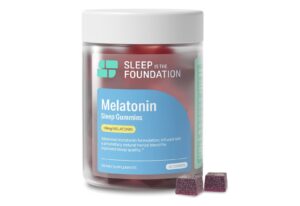Is It Safe to Take Melatonin Every Night?
- Melatonin is safe for short-term use and can be helpful for sleep issues.
- Long-term use of melatonin may lead to decreased effectiveness and impact your natural melatonin production.
- Watch for side effects of excessive melatonin use, including headaches, nausea, and fatigue.
- Consult with a healthcare professional before considering melatonin use for your situation.
Melatonin is a hormone produced by the body that helps regulate sleep. The production of melatonin increases in response to darkness, prompting the feeling of sleepiness. When a person is exposed to light, melatonin production decreases, prompting the feeling of wakefulness.
People may take melatonin in supplement form to treat certain sleep problems and fall asleep faster. These supplements are often made synthetically in a lab and are available in multiple forms, including pills, patches, and liquids. Learn whether melatonin is safe to take every night, the side effects of melatonin, and proper dosage of melatonin in both adults and children.
Get to the root of your sleep problems
Melatonin can help, but it’s best to find the source of your sleep issues. Answer these questions to better understand your sleep.
Can You Take Melatonin Every Night?
It is typically safe for adults to take melatonin every night for short periods of time. Several factors affect whether an individual should take melatonin every day such as their specific sleep problem, their age, and other health factors. For example, those who experience jet lag may take melatonin daily for up to five days.
Overall, because melatonin may negatively impact people who take certain medications or have certain health conditions, anyone who wishes to take it should talk to their doctor first. A doctor can help determine if melatonin is safe for a person and what dosage might be right for them.
Side Effects of Melatonin
Taking melatonin as recommended is safe for most adults. If side effects occur, they are usually mild. Potential side effects include:
- Headaches
- Dizziness
- Nausea
- Sleepiness
- Stomachache
Melatonin is typically safe when used short-term , but research on its long-term effects is limited. Some experts have suggested that because melatonin is a hormone, it may disrupt hormonal processes like puberty and the menstrual cycle. But, there is not enough reliable research to show concrete evidence of this effect.
Melatonin Supplements and Safety Concerns
People with certain conditions should consult with a health care provider before using melatonin supplements:
- Reproductive Health: People who are trying to conceive a child may want to avoid supplemental melatonin as there is some evidence that melatonin may affect fertility in both men and women.
- Pregnancy and Breastfeeding: There is a lack of reliable evidence regarding the safety of melatonin use in pregnant people and those who are breastfeeding . Therefore, experts generally recommend against melatonin supplementation during this time.
- Bleeding Disorders: People with bleeding disorders like anemia should avoid taking melatonin because it may slow the process of blood clotting and make bleeding worse.
- Epilepsy: It is possible that melatonin may increase seizures, so melatonin is not recommended for people with epilepsy.
- Autoimmune disorders: Melatonin may increase symptoms associated with autoimmune diseases, so individuals with these disorders should refrain from taking melatonin.
Melatonin may interfere with the action of some medications, including:
- Blood thinners
- Medications for epilepsy
- Birth control
- Diabetes medications
- Blood pressure medications
Dependence on Melatonin Supplements
The long-term effects of melatonin and the risk of developing a dependency are not well understood. However, there is evidence that using other sleep aids, such as prescribed hypnotics or over-the-counter sleeping pills that contain antihistamines, may cause dependency issues.

Recommended Melatonin Dosage
There is no general consensus on how much melatonin people should take . Typically, health care providers make dosage recommendations based on the individual and what kind of problems are interfering with their sleep. In general, melatonin is best taken at night around one to two hours before bed, around the same time natural melatonin increases.
In the U.S., the Food and Drug Administration (FDA) does not regulate melatonin sleep aids as a prescription drug because they are categorized as a dietary supplement. That means the melatonin found in stores varies in terms of dosage and label accuracy.
Talk to your doctor before taking melatonin, especially if you are taking other medications or are considering taking the supplement for an extended period of time. Typically, the initial dosage of melatonin should be set at the lowest amount needed to alleviate symptoms. Over time, dosage may be increased if necessary.
Melatonin for Insomnia
Some people take melatonin for insomnia, a common sleep problem that involves difficulty falling asleep or staying asleep. Insomnia also involves daytime symptoms such as fatigue, irritability, and cognitive issues.
Taking melatonin may be a useful treatment for short-term insomnia, specifically insomnia that involves trouble falling asleep. For this specific use, dosage may vary from person to person, but it is suggested to take doses that range from 1 to 5 mg. People with insomnia may experience the benefits of supplemental melatonin by taking it a few hours before going to sleep.
Insomnia symptoms are considered chronic when they occur three or more nights per week, for three months or longer. Right now, there is not sufficient evidence that shows melatonin is an effective treatment for chronic insomnia.
Melatonin for Jet Lag
Melatonin may alleviate symptoms of jet lag, a disorder that occurs when someone’s internal sleep-wake schedule does not match the time zone in their new location after traveling. It is best to take melatonin in the evening of the time zone where the destination is located.
Melatonin dosage for treating jet lag may depend on the direction and distance a person is traveling. When traveling eastward, experts suggest taking 3 mg melatonin, but dosages as low as 0.5 mg and as high as 10 mg have been shown to be effective.
Long-distance travelers can take melatonin every evening upon arrival for up to five days. This dosage is also suggested for westward travel that crosses more than twelve time zones. Westward travel that spans less than twelve time zones usually does not require melatonin usage.
Melatonin for Shift Workers
People who work night shifts or a rotating shift schedule may benefit from taking melatonin. Some research shows that taking melatonin in the evening may help people readjust their sleep after a shift change. However, experts note that current evidence is somewhat inconclusive. Shift workers who are struggling to find restorative sleep should consult with their doctor as well as their employer.
Melatonin Dosing in Children
Melatonin is sometimes recommended for children who have trouble falling asleep due to insomnia. Parents and caregivers who are considering giving their children melatonin should talk with their child’s doctor first. Children should only take melatonin when there is medical need as directed by a healthcare provider.
The consensus on specific dosage varies across current research, but in general, melatonin is tolerated in dosages up to 3 mg in children and dosages up to 5 mg in adolescents. Melatonin dosage should begin at the lowest level needed to be effective, and then increased from there
Melatonin should not be given to children to improve sleep when the child is otherwise healthy and does not have any sleep disorders. Parents and caregivers should always keep melatonin and other dietary supplements in safe storage and out of reach of children.
How to Fall Asleep Without Melatonin
Besides melatonin, there are other methods to fall asleep faster such as taking alternative medications and making lifestyle changes that promote healthy sleep. Healthy sleep habits that may help individuals who have trouble falling asleep include:
- Adjusting the sleep environment: Sleep-friendly bedrooms should be cool, quiet, and dark. Block light from windows at night and try to avoid using digital devices in the sleep space.
- Developing a routine: If possible, try to fall asleep and wake up around the same time each day. Continue this schedule even on days with no external obligations, like weekends and vacation.
- Managing stress: Learn new relaxation techniques such as meditation or yoga. Listening to music may also help promote relaxation.
- Exercising regularly: Exercise during the day may promote healthy sleep at night. Experts recommend adults exercise about 150 minutes per week , which comes out to 30 minutes a day for 5 days. Of course, a person can exercise for shorter or longer periods, if that works better with their schedule.
- Watching food and beverage consumption: Try not to eat large meals right before going to sleep, as this could interfere with sleep. Also, avoid caffeine and alcohol before going to bed as well.
Try Alternative Sleep Aids
Other alternatives to taking melatonin include using a different sleep aid or medication. Most over-the-counter sleep aids fall under the category of antihistamines, which are drugs typically used to treat allergies. These over-the-counter drugs are relatively easy to find in stores and are often marketed as “PM” formulations.
However, people should be cautious before trying this type of sleep aid, because it may interact with other medications or be discouraged if certain other health conditions are present. Also, long-term use of these over-the-counter sleep aids may increase tolerance over time, which means a person would have to continue taking more to continue seeing effects.
Finally, there are other sleep medications that a doctor may consider prescribing in addition to behavioral therapies for people who have trouble sleeping:
- Benzodiazepine receptor agonists (Z-drugs)
- Melatonin receptor agonists
- Orexin receptor antagonists
- Benzodiazepines
These medications require a doctor’s prescription because they may cause withdrawal symptoms and have an increased risk of becoming habit-forming. They can also become less effective over time. These drugs can be especially dangerous when combined with other medications that cause sedation effects, like alcohol, antihistamines, and antidepressants.
Talk to Your Doctor About Sleep Issues
Even though melatonin is usually safe for most people to take short-term, talk to your health care provider if you are considering taking it daily for sleep issues. Also, if sleep troubles are starting to affect your daily life, talk to your doctor about your symptoms and potential treatment options.

Still have questions? Ask our community!
Join our Sleep Care Community — a trusted hub of sleep health professionals, product specialists, and people just like you. Whether you need expert sleep advice for your insomnia or you’re searching for the perfect mattress, we’ve got you covered. Get personalized guidance from the experts who know sleep best.
References
10 Sources
-
Owens, J. A. (2023, January 3). Pharmacotherapy for insomnia in children and adolescents: A rational approach. In R. D. Chervin (Ed.). UpToDate., Retrieved January 23, 2023, from
https://www.uptodate.com/contents/pharmacotherapy-for-insomnia-in-children-and-adolescents-a-rational-approach -
Goldstein, C. A. (2022, April 5). Jet lag. In R. Benca (Ed.). UpToDate., Retrieved January 23, 2023, from
https://www.uptodate.com/contents/jet-lag -
National Center for Complementary and Integrative Health. (2022, July). Melatonin: What you need to know., Retrieved January 23, 2023, from
https://www.nccih.nih.gov/health/melatonin-what-you-need-to-know -
Shane-McWhorter, L. (2022, January). Melatonin. Merck Manual Consumer Version., Retrieved January 23, 2023, from
https://www.merckmanuals.com/home/special-subjects/dietary-supplements-and-vitamins/melatonin -
Vine, T., Brown, G. M., & Frey, B. N. (2022). Melatonin use during pregnancy and lactation: A scoping review of human studies. Revista Brasileira de Psiquiatria (Sao Paulo, Brazil: 1999), 44(3), 342–348.
https://pubmed.ncbi.nlm.nih.gov/34730672/ -
Neubauer, D. N. (2022, December 19). Pharmacotherapy for insomnia in adults. In R. Benca, & J. G. Elmore (Eds.). UpToDate., Retrieved January 23, 2023, from
https://www.uptodate.com/contents/pharmacotherapy-for-insomnia-in-adults#H2582713949 -
A.D.A.M. Medical Encyclopedia. (2022, May 12). Medications for sleep. MedlinePlus.
https://medlineplus.gov/ency/patientinstructions/000758.htm -
Shane-McWhorter, L. (2023, January). Melatonin. Merck Manual Professional Version., Retrieved January 23, 2023, from
https://www.merckmanuals.com/professional/special-subjects/dietary-supplements/melatonin -
Centers for Disease Control and Prevention. (2022, June 2). How much physical activity do adults need?, Retrieved February 1, 2023
https://www.cdc.gov/physicalactivity/basics/adults/index.htm -
Schwab, R. J. (2022, May). Insomnia and excessive daytime sleepiness (EDS). Merck Manual Consumer Version., Retrieved January 25, 2023, from
https://www.merckmanuals.com/home/brain,-spinal-cord,-and-nerve-disorders/sleep-disorders/insomnia-and-excessive-daytime-sleepiness-eds










